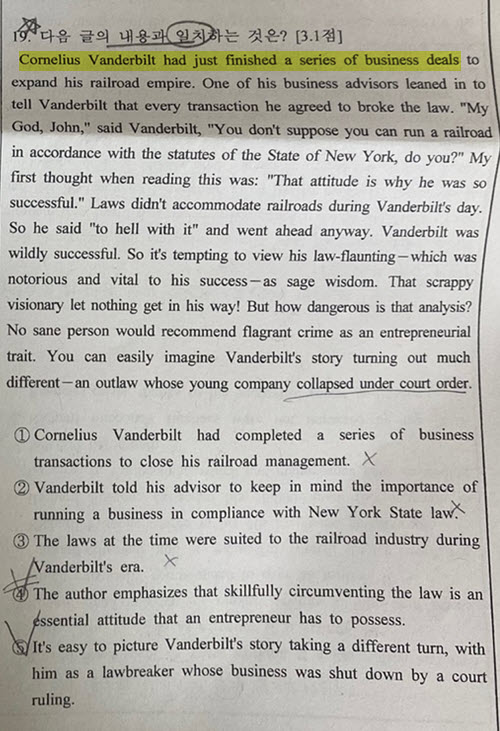대구외고 1학년 2학기 중간고사 시험분석(심화영어)-(8)
이상엽 쌤은 대구외고 수험생들을 위해 선생님들의 출제경향을 정확히 분석해 맞춤예상 문제를 제공합니다. 영어가 어렵고, 막막해서 공부 어디서 할까 고민이면, 찍신 이상엽 쌤을 찾으세요! 수업문의 010 2818 6994
학교 출제 문제 / 찍신 쌤 출제 문제 <비교>
심화영어 19번 (내용 일치)

찍신 쌤 시험대비 출제 문제
[35~38] 다음 글을 읽고, 물음에 답하시오.
Cornelius Vanderbilt had just finished a series of business deals to expand his railroad empire.
One of his business advisors leaned in to tell Vanderbilt that every transaction he agreed to broke the law.
“My God, John,” said Vanderbilt, “You don’t suppose you can run a railroad in accordance with the (a) statutes of the State of New York, do you?”
My first thought when reading this was: “That attitude is why he was so successful.” Laws didn’t ① accommodate railroads during Vanderbilt’s day. So he said “to hell with it” and went ahead anyway. Vanderbilt was wildly successful. So it’s ② tempting to view his law-flaunting—which was notorious and vital to his success—as (b) sage wisdom. That scrappy visionary let nothing get in his way!
But how dangerous is that analysis? No sane person would recommend (c) flagrant crime as an entrepreneurial trait. You can easily imagine Vanderbilt’s story turning out much different—an outlaw whose young company collapsed under court order.
So we have a problem here.
You can praise Vanderbilt for flaunting the law with as much passion as you criticize Enron for doing the same. Perhaps one got lucky by avoiding the arm of the law while the other found itself on the side of risk.
John D. Rockefeller is similar. His frequent (d) circumventing of the law—a judge once called his company “no better than a common thief”—is often portrayed by historians as cunning business smarts. Maybe it was. But when does the narrative shift from, “You didn’t let ③ modern laws get in the way of innovation,” to “You committed a crime?” Or how little would the story have to shift for the narrative to have turned from “Rockefeller was a genius, try to learn from his successes,” to “Rockefeller was a criminal, try to learn from his business failures.” Very little.
“What do I care about the law?” Vanderbilt once said. “Ain’t I got the power?”
He did, and it worked. But it’s ④ easy to imagine those being the last words of a story with a very different outcome. The line between bold and reckless can be thin. When we don’t give risk and luck their proper (e) billing it’s often ⑤ invisible.
35. 윗글의 제목으로 가장 적절한 것을 고르시오. [2.5점]
① Outlaws in Business Suits Praise Crime as Innovation
② Bold Visionary or Reckless Outlaw: The Fine Line of Crime
③ Bold Visionary or Reckless Outlaw: The Thin Line of Success
④ Reckless Outlaw: How Crime Built an Empire of Iron Rails
⑤ Vanderbilt and Rockefeller: The Thin Line Between Bold and Reckless
36. 윗글의 밑줄 친 부분 중, 문맥상 낱말의 쓰임이 적절하지 않은 것을 고르시오.
37. 윗글의 밑줄 친 (a)~(e)의 문맥상 의미로 적절하지 않은 것은? [2점]
① (a) : a law enacted by the legislative branch of a government
② (b) : profoundly wise or prudent
③ (c) : shockingly noticeable or evident
④ (d) : to get around (something) in a clever and sometimes dishonest way
⑤ (e) : the cost of goods or services billed to a customer
38. 윗글에 대한 설명이나 추론으로 가장 적절하지 않은 것은? [2.5점]
① Vanderbilt and Rockefeller operated in a time when laws didn’t fully accommodate the growth of new industries like railroads and oil.
② Vanderbilt and Rockefeller were incredibly successful in part because of their law-breaking.
③ Success in business can sometimes be achieved through questionable means.
④ The same boldness that led to Vanderbilt’s and Rockefeller’s success could be justified because of the unpredictable nature of business ventures.
⑤ Aspiring entrepreneurs should recognize the fine line between boldness and recklessness.
[서술형 6]
윗글을 <조건>에 맞게 요약하시오. [4점, 부분점수 있음]
<조건> – 본문에서 단어를 4단어 연속 차용하지 말 것. – 제시어를 포함 25자 이내로 쓸 것. 제시어 어형 변형 가능 – 제시어: a law-breaking entrepreneur / genius / criminal / luck / depend on / whether |
→
대구외고 1학년 2학기 중간고사 심화영어 분석
35. ⑤
36. ③ (modern → outdated)
37. ⑤
statute: 법규, 법령 / sage: 현명한 / flagrant: 노골적인, 명백한 / circumvent: (법 등을) 피하다, 면하다
해설: billing은 단어 뜻 그대로 ‘청구’가 아니라 맥락상 인정(recognition), 평가(appraisal), 설명(accounting for)을 암시하는 은유적 표현이다. 저자는 대담한 기업가의 행동과 결과를 평가할 때 그들의 성공이 얼마나 대담함 덕분인지, 아니면 예측할 수 없는 행운과 위험 요인 덕분인지를 인정하는 것이 중요하다고 강조하고 있다.
38. ④
[서술형 6] 모범 답안
Whether a law-breaking entrepreneur is remembered as a visionary genius or a reckless criminal depends largely on luck and outcome.
(법을 어긴 기업가가 비전을 가진 천재로 기억되는지 무모한 범죄자로 기억되는지는 주로 행운과 결과에 달려 있다.)
[지문해석]
밴더빌트(Cornelius Vanderbilt)는 자신의 철도 제국을 확장하기 위한 일련의 사업 거래를 막 끝냈습니다. 그의 사업 고문 중 한 명이 다가와 밴더빌트에게 그가 합의한 모든 거래가 법을 위반한 것이라고 말했습니다.
“이런, 존(John),” 밴더빌트는 말했습니다. “뉴욕 주 법규를 지키면서 철도를 운영할 수 있다고 생각하는 건 아니겠지?”
제가 이 말을 처음 읽었을 때 든 생각은 “그 태도가 그를 성공하게 만든 이유다”였습니다. 밴더빌트 시절에는 법이 철도를 고려하지 않았습니다. 그래서 그는 “그냥 신경 쓰지 말자”라고 결심하고 일을 진행했습니다.
밴더빌트는 엄청난 성공을 거두었습니다. 그래서 그의 악명 높은 법 무시 행위가 그의 성공에 필수적이었다고 여기는 것이 유혹적일 수 있습니다. 그 끈질긴 비전가는 아무것도 그의 길을 막지 못하게 했습니다!
하지만 이러한 분석은 얼마나 위험할까요? 어떤 이성적인 사람도 대놓고 범죄를 저지르는 것이 기업가 정신의 한 부분이라고 권장하지는 않을 것입니다. 밴더빌트의 이야기가 전혀 다른 방향으로 흘러가는 것도 쉽게 상상할 수 있습니다. 법정 명령으로 인해 젊은 회사가 붕괴되는 범죄자로 전락하는 시나리오 말입니다.
여기서 우리는 하나의 문제에 봉착하게 됩니다. 밴더빌트가 법을 어긴 것을 열정적으로 칭찬하면서도, 동시에 엔론(Enron)의 법 무시 행위에 대해 비판할 수 있습니다. 아마도 한쪽은 법의 손길을 피하는 데 운이 좋았고, 다른 쪽은 위험의 편에 섰기 때문일 것입니다.
존 D. 록펠러(John D. Rockefeller)도 비슷한 인물입니다. 그의 빈번한 법의 우회 행위에 대해 한 판사는 그의 회사를 “일반 도둑과 다를 바 없다”고 평하기도 했습니다. 하지만 역사학자들은 종종 그의 행위를 영리한 사업 수완으로 묘사합니다. 아마 그럴 수도 있습니다. 그러나 언제 이야기는 “당신은 구식 법에 얽매이지 않고 혁신을 이뤄냈다”에서 “당신은 범죄를 저질렀다”로 바뀌는 걸까요? 또는 이야기가 “록펠러는 천재였으며 그의 성공에서 배워라”에서 “록펠러는 범죄자였으며 그의 사업 실패에서 배워라”로 바뀌려면 얼마나 조금만 달라져야 할까요? 거의 변화가 필요하지 않을 것입니다.
밴더빌트는 이렇게 말한 적이 있습니다. “내가 법에 신경 써야 할 이유가 뭐지? 내가 힘을 가지고 있지 않나?”
그는 힘을 가지고 있었고, 그것이 통했습니다. 하지만 이 말이 매우 다른 결말의 이야기의 마지막 말이 될 수도 있었을 것입니다. 대담함과 무모함 사이의 선은 얇을 수 있습니다. 우리가 위험과 운의 역할을 제대로 평가하지 못하면, 그 경계는 쉽게 보이지 않을 수 있습니다.


